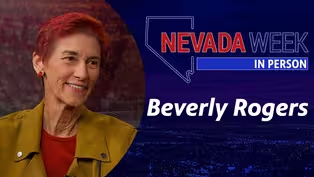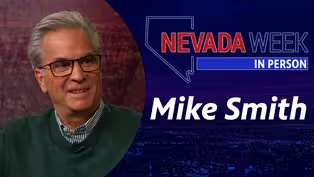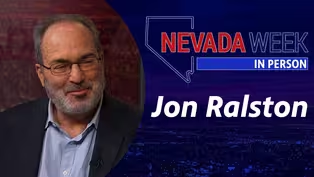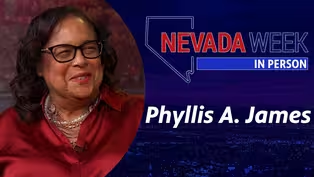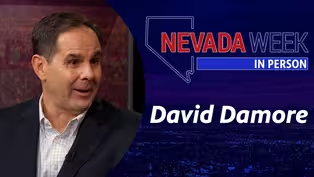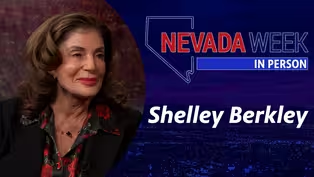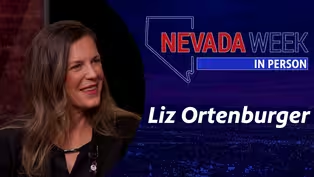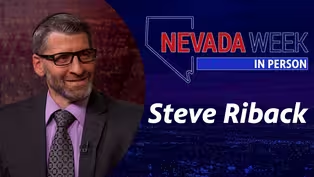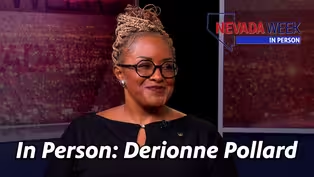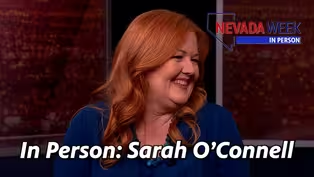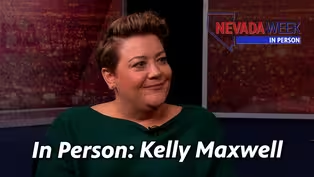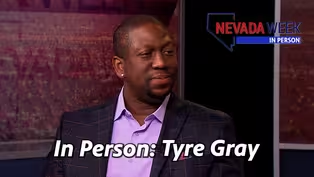
Nevada Week In Person | Darren Waller
Season 1 Episode 50 | 14mVideo has Closed Captions
One-on-one interview with Las Vegas Raider tight end Darren Waller.
One-on-one interview with Las Vegas Raider tight end Darren Waller.
Problems playing video? | Closed Captioning Feedback
Problems playing video? | Closed Captioning Feedback
Nevada Week In Person is a local public television program presented by Vegas PBS

Nevada Week In Person | Darren Waller
Season 1 Episode 50 | 14mVideo has Closed Captions
One-on-one interview with Las Vegas Raider tight end Darren Waller.
Problems playing video? | Closed Captioning Feedback
How to Watch Nevada Week In Person
Nevada Week In Person is available to stream on pbs.org and the free PBS App, available on iPhone, Apple TV, Android TV, Android smartphones, Amazon Fire TV, Amazon Fire Tablet, Roku, Samsung Smart TV, and Vizio.
Providing Support for PBS.org
Learn Moreabout PBS online sponsorshipMore from This Collection
Nevada Week In Person goes beyond the roundtable discussion of Nevada Week with guests for a more casual conversation about their personal passions, new projects and compelling stories that are overlooked in the flurry of the news cycle.
Nevada Week In Person | Beverly Rogers
Video has Closed Captions
One-on-one interview with Rogers Foundation chair Beverly Rogers. (14m)
Nevada Week In Person | Mike Smith
Video has Closed Captions
One-on-one interview with Las Vegas Sun political cartoonist Mike Smith. (14m)
Nevada Week In Person | Jon Ralston
Video has Closed Captions
One-on-one interview with The Nevada Independent CEO Jon Ralston. (14m)
Nevada Week In Person | Phyllis A. James
Video has Closed Captions
One-on-one interview Phyllis A. James. (14m)
Nevada Week In Person | David Damore
Video has Closed Captions
One-on-one interview with Chair of the Department of Political Science at UNLV David Damor (14m)
Nevada Week In Person | Shelley Berkley
Video has Closed Captions
One-on-one interview Senior Vice President for Touro University Shelley Berkley. (14m)
Nevada Week In Person | Liz Ortenburger
Video has Closed Captions
One-on-one interview with SafeNest CEO Liz Ortenburger. (14m)
Nevada Week In Person | Steve Riback
Video has Closed Captions
One-on-one interview with Las Vegas Metro Police Lieutenant Steve Riback. (14m)
Nevada Week In Person | DeRionne Pollard
Video has Closed Captions
One-on-one interview Nevada State College President DeRionne Pollard. (14m)
Nevada Week In Person | Sarah O’Connell
Video has Closed Captions
One-on-one interview with Director of Eat More Art LLC Sarah O’Connell. (14m)
Nevada Week In Person | Kelly Maxwell
Video has Closed Captions
One-on-one interview with Baby’s Bounty Executive Director Kelly Maxwell. (14m)
Nevada Week In Person | Tyre Gray
Video has Closed Captions
One-on-one interview with Nevada Mining Association President Tyre Gray. (14m 1s)
Providing Support for PBS.org
Learn Moreabout PBS online sponsorshipAn NFL Pro Bowler and a recovering addict, Las Vegas Raiders Tight End Darren Waller joins us this week for Nevada Week In Person .
♪♪♪ Support for Nevada Week In Person is provided by Senator William H. Hernstadt.
-Welcome to Nevada Week In Person.
I'm Amber Renee Dixon.
His physical health has dominated headlines this season, but his mental health is what he says led to a substance abuse addiction, countless failed drug tests, and multiple arrests.
Now the Raiders' tight end is utilizing his experience to help local youth access drug rehabilitation.
Darren Waller, thank you for joining us for Nevada Week In Person.
(Darren Waller) Thank you for having me.
It means a lot.
-Is it hard to hear some of those things?
-No, it's not.
It's just what life is, you know?
If you look at it, like you said, this season, my health hasn't been what I want it to be.
I haven't been available to help my team the way I wanted to.
And it's a little bit frustrating, but that's a reality that I have to accept and just work towards getting myself healthy and back out there.
And just as far as my past, you know, that's become my greatest asset as far as impacting the world.
And helping other people has been my dark past, so I considered it an asset.
-You are on injured reserve, only able to play five games this season.
In the past, this inability to play, to show off your tremendous skills and size and even the questions that are surrounding your commitment to the team, in the past would this perhaps have led to a relapse for you?
-Oh, for sure.
If I was-- Yeah, if I wasn't as far and as dedicated to just my program of recovery and what keeps me going in the direction I want to go, yeah, I'm never immune to a relapse.
If I slip back in the work that I do for myself and for other people, I'm going to be headed towards that.
So I realize the severity of it.
I know that in times like this is where, you know, I gotta continue to, you know, be about what I talk about.
I can't just fake the funk; I really got to walk it on a day-to-day basis.
-Tell me what kind of work you have been doing personally as a result of your current situation.
-It's just continued growth in relationship with God for me, meditating, continuing to write in my journal, continuing to go to meetings, continuing to make music, continuing to do things that just fill me up and focus on just, you know, I'm a human being at the end of the day.
I gotta take care of the person first.
The performance aspect of it, you know, there's been great moments throughout my career.
There's been low moments throughout my career.
There's been moments that have been in the middle.
So I'm always going to do my best there to put myself in a position to succeed, but that success may not always look like how I want it to be.
But I can always take care of myself in the process.
-In terms of your journey, you were suspended by the Baltimore Ravens for substance abuse issues.
That led to you being out of football for a whole year, and I believe you worked in a grocery store at that time.
What was that like?
-Yes, correct.
I worked at Sprouts Farmers Market back where I grew up, in like metro Atlanta area and Georgia.
Worked there for seven months.
And it's a very humbling experience.
I feel like it was a humbling experience I needed.
It allowed me to just go in and, you know, relearn the value of hard work without having 80,000 people clap for you or people singing your praises on Twitter or in news articles.
You know, you just do your work.
You serve people, you have a good attitude, and you do what you do, and then you go home.
And so I feel like that just laid a foundation for me to be able to handle success that I have now and even moments where it's like it feels like the success has gone away sometimes.
It just keeps me grounded and realize it's about the work that I do.
It's about what I bring to the table as opposed to what I get out of a situation.
-And tell me about the timeline.
When did you go to rehab, and how did you get to go to rehab?
-Yes, so I went to rehab in September of 2017.
This was a month after I overdosed.
So it was-- That month of time gave me time to be like, okay, like I really-- I really need to go give this a chance and go in there, stay in there for like four days in detox and 30 days of in-patient in Maine.
It was just a game-changing experience for my life.
It was the first time I ever realized like, wow, like I really need to be honest.
I need to, you know, go back and visit pains and traumas from my past because those all contribute to why I started doing drugs and drinking in the first place.
It was really just to get unwanted feelings and unwanted memories out of my head, out of my psyche.
So just learning all those things allowed me to really just build a new foundation for my life.
-Was it the NFL who made that rehab possible?
-Yeah, the NFL paid for it.
I didn't have to pay a dime.
It was through the drug program.
I had a case manager.
His name was Oliver, Oliver Walcott.
He was, you know, he was calling my phone so much.
I would just be like, I'm not trying to talk to this dude.
But, you know, he stuck by me and really, like, let me know there were resources available to me if I wanted to pursue them.
And I realized that was something I needed to do after the overdose experience that I had.
And so the league was there to help me, and that's part of the big reason why I try to pay back to the community, because I had a gift freely given to me to change my life, so who am I to not pay that forward?
-What was what you overdosed on?
-I was-- I love Percocet.
So it was, like, I feel like I got a batch of Percocets that had fentanyl in them.
-And little did you know how big of an issue that would become now.
-Exactly.
-Boy, okay.
So you go through rehab, you get a second chance with the Raiders, you're there in Oakland for a couple of years, you come to Las Vegas, and you launch your foundation here, the Darren Waller Foundation.
What are you doing?
-So the Darren Waller Foundation, the whole mission is to help young people that are struggling with substance abuse issues, give them an opportunity to go to treatment, go to rehab, and we've expanded that into having an aftercare plan because you go to rehab and a lot of people, 30 days isn't enough for them.
They need more care, so putting them in an aftercare environment to be able to, you know, be around people that are continuing to emphasize the principles and the tools that they need to use to continue to use before they go back and transition into the world just on their own, you know?
It gives them more time to just get back on their feet, and make those tools even more a part of their character so that they can transition the best way possible into what their life is gonna look like on the other side.
So we just try to help in that process the best that we can.
-I want to mention, you are five years sober?
-Yep.
-The foundation is in its third year of existence.
How many young people have you helped?
-We've put over 30 people on scholarship through a 30-day treatment program and that have completed and have gone into aftercare programs, whether it be Sober Living or things like that.
So it's pretty-- It's amazing.
It's surreal to think about.
-And all with local youth and local programs that are helping them?
-Yes, yeah.
Everybody's from the Las Vegas, Clark County area.
-What is it like when you get to meet someone who has benefited from this scholarship?
-Yeah, it just puts things into perspective, you know?
It just lets me know, like, okay, there's been a lot of times that where I haven't really done, like, positive work in the world.
Like, I haven't really done anything to enrich the lives of other people.
It's really just been all about myself.
But then I'll go to a random meeting, and somebody will be in there and be like, Hey, I got clean because I got a scholarship through your foundation.
And meeting people like that, it's just like, wow!
Like, I can't believe that I'm even in a position here, you know, thinking back, like what five years ago was like.
So I just hope that through me, given that, that they'd be able to continue to pass the gift on, and it just continues to go.
-How expensive is rehab?
-It depends on where you go, the quality you get.
The place that I went to, it was $65,000 for 30 days.
So you have really high-end rehabs, and then you have ones that aren't as much.
So it all just depends on the route you choose to go.
-Okay, but those costs are not affordable for, for many families.
-Yeah.
So it's important to be like, that's the group that we try to, you know, bless the most is the ones that can't afford it, the ones that don't really have an option.
It's like, you know, allowing them to have a chance to receive it, because I wouldn't have paid for the quality of care that I paid for.
I'd look at the bill and be like, I'm not doing this.
But to be able to offer that to somebody else, I feel like that's just the right thing to do.
-Is it parents who are reaching out on behalf of their kids, or how is this scholarship program working?
-Yeah, so it's really people apply for it, whether it be through a court program or they'll apply through the foundation directly.
And we base it off of criteria of, you know, do they have the means to pay for it?
Do they have-- If somebody has insurance and the ability to pay for it, we don't think that's as fair as somebody that doesn't have that option.
We try to keep it within that criteria.
-When I think about-- For example, Prolanthropy is the agency that helps spread the message about what you're doing, and they work with other pro athletes, too, like Von Miller.
And his program is Von's Vision.
It's for free vision care for uninsured children.
And then you've got like Kenley Jansen, and he is providing distraction and play for kids who are dealing with chronic illnesses.
These are important causes, but they're not gritty like what you're doing.
You're attaching your name and your face and your experience to something that's just not very glamorous.
Did you ever have any trepidations about that?
Did your family ever say anything like, Oh, I don't know if you want to be so public about this?
-There were moments where-- because naturally I'm a shy kind of emotional, just sensitive guy.
So I don't really want to put myself out there.
I've kind of grown out of that, but just being newly sober, I didn't have plans of just, you know, being a voice for this and being out on the front lines.
It kind of just happened.
Back in 2019, we had the Hard Knocks.
I remember the team was like, You don't have to do this interview if you don't want to, but they're trying to talk to you.
And I was like, well, I don't have anything-- I'm not afraid of anything anymore.
So I was just going on there, answering questions in an honest fashion.
I didn't know that it would have the impact that it did.
But throughout that process, you know, just through my relationship with the God of my life, I feel like it was just like, this is something that you need to do.
These people need a face; they need somebody that's in a position of success that they can relate to and know that, you know, my life, I may have ran it into the ground numerous times, but I can still get back up and do something positive from this point forward.
-In addition to the scholarship program, you also have "Wall Talks," which you go around and you are brutally honest about everything that you have gone through.
I watched one that was at Nellis Air Force Base.
What do you believe you are getting out of those, and what are viewers getting out of those?
-I believe it's just a further insertion of my story and just my truth into the public, just to let them know, like continuously, this is-- this is who I have to be.
This is how I have to live my life in an honest fashion.
I can't, you know, go about things trying to hide or, you know, put on a mask or make things seem like I'm better than what I'm really doing, you know?
I'm in a position of success, but you know, I still deal with anxiety and depression.
You know, it comes in waves and comes and goes, and I still have to navigate that.
Just because I've accomplished a certain amount of things doesn't mean that I have this perfect life that doesn't have any problems or issues that I still need to grow through.
So I just try to put that out there for them to let them know that anything they're striving towards, they don't have to be perfect to attain it.
-At that "Wall Talk" that I mentioned, you mentioned that you struggle with integrity at times; that in the past, you would wear masks for different people.
We all wear masks, though.
How much do you find yourself wearing masks these days?
-Definitely not as much as I used to.
It can be tough sometimes just being in such a performance driven industry.
You know, like you said, like me being injured, people were like, What are-- What are we doing?
We just-- We just gave him a contract.
He needs to be out there doing this, that, and the third.
And it's like it's easy to get caught up in that performance mindset like, let me bypass my health; let me bypass, you know, taking care of myself just to please these people and show them that I'm still who they say I am or things like that.
Like your pride and your ego wants to butt into the equation.
So sometimes it's tough to kind of keep that at bay, but I feel like that's really the only big fight that I still have from time to time to try to keep my mind out of.
-Is the performance aspect?
-Yeah.
-Even what we're doing now is a performance.
-A little bit, but I just try to-- Like I said, I just try to show up as authentically as I possibly can.
And, you know, I feel like I'm tough enough to live with what the results may be.
They may be what people love sometimes.
They may not.
They may be, like, people may be like, What the heck?
This isn't what we expected.
But I'm tough enough to be able to deal with any kind of comments and just continue to show up as who I am.
-And being a people pleaser is an aspect you've talked about that you've-- -Oh, yeah.
- --struggled with your whole life.
How much of it is an issue still?
-A big problem.
I'd say that it's, you know, to the extent of football, you know, in that performance aspect.
Just me being a process driven person, I'm like, okay, like, you know, the results may not always be what I want them to be, but I can continue to grow, continue to strive.
A lot of times people aren't really going for that in the NFL.
It's like, We need to win now.
We need to do this.
If it's not this way, then it's a failure.
And it's kind of a little bit against of how I try to approach day-to-day and my values, but at the end of the day, I know that I need to find a good balance and show up and give the best that I can.
And I know what my best is capable of.
I just need to be able to stay grounded in the process because things are going to happen.
I may not be as healthy as I want to be, but when I get back out there, I'm gonna get back to giving it the best I can like I always have.
-Darren Waller, thank you so much for joining Nevada Week In Person.
And to see more Nevada Week In Person, go to vegaspbs.org/nevadaweek.

- News and Public Affairs

Top journalists deliver compelling original analysis of the hour's headlines.

- News and Public Affairs

FRONTLINE is investigative journalism that questions, explains and changes our world.












Support for PBS provided by:
Nevada Week In Person is a local public television program presented by Vegas PBS
